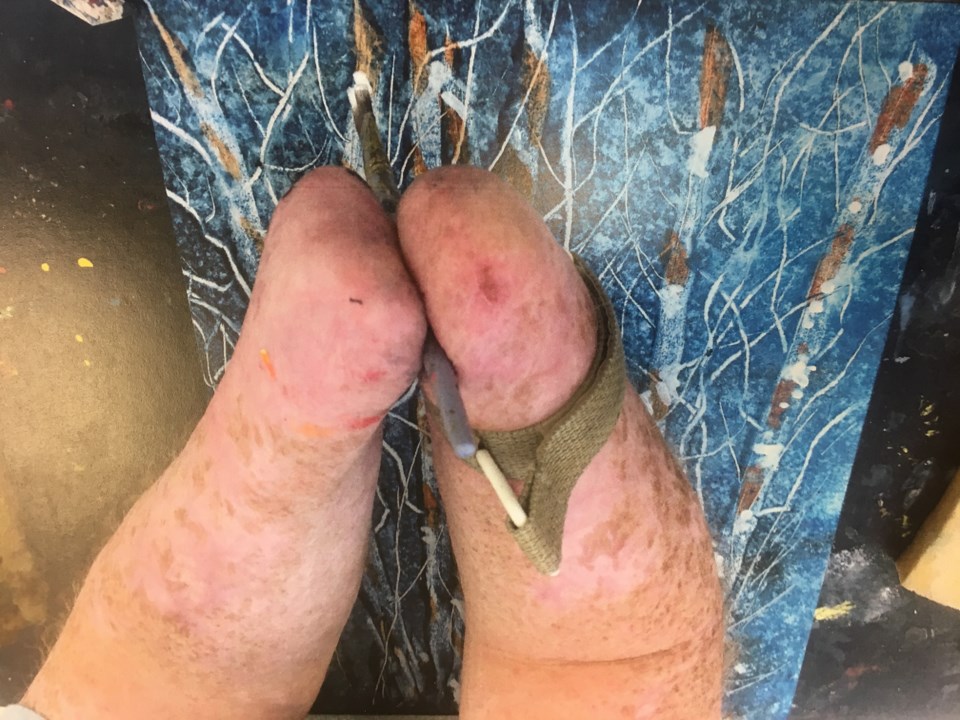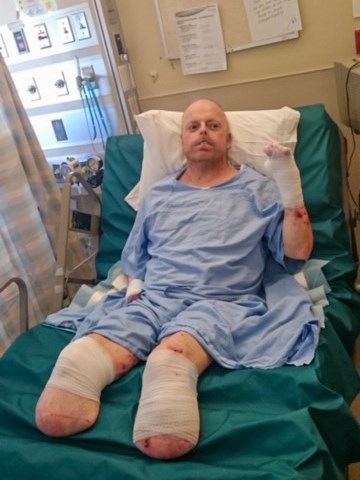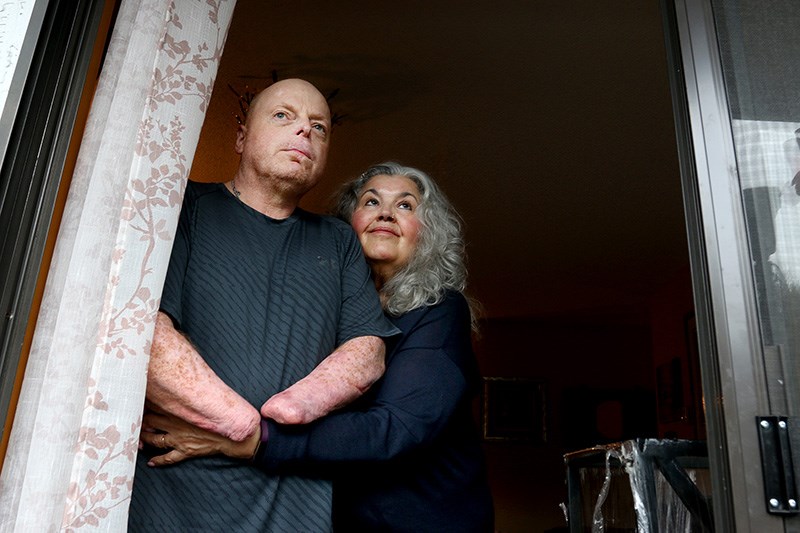A Coquitlam man is set to be the first patient to ever receive a double hand transplant in Canada five years after bacterial meningitis — and septic shock — took his hands and feet.Ěý
In April 2015, Rick Thompson woke up in the middle of the night with what he thought was a 24-hour bug.Ěý
“I woke up because I was really thirsty,” he told The Tri-City News. “I try to go downstairs and my feet feel like they’re on fire… I’m freaking out.”
The last thing Thompson remembers is standing in the living room where his wife, Rita, was watching TV. He was rushed to hospital as, one by one, his organs started to fail. Septic shock — an infection of the blood — led doctors to put him into a medically induced coma. On life support, Thompson said he was given a 5% chance of survival, all the result of what he thinks was an infected cut.
Six weeks later, he woke up in Royal Columbian Hospital and was offered a choice: prepare for death or undergo amputation.
“They gave us three hours to think about it and decide what we want to do,” said Thompson.Ěý
He was still incoherent after coming out of the coma when Rita drew a stick person on a whiteboard without hands or feet. Then she pointed at her husband.
“The will to live is going to trump anything,” Thompson said, remembering when he decided to push ahead with the amputations over death.
The first nine months after losing his hands and feet, Thompson was, at times, paralyzed by depression; in other moments, he was buoyed by friends and family as he underwent several rounds of rehabilitation at Eagle Ridge Hospital.
Before the amputations, Thompson rode motocross and was a supervisor at a restaurant and hotel food supplier. Now, he couldn’t work, couldn’t even move under his own power.
He needed a new hobby.
In those early days, mentor Jack Prasad remembers Thompson telling his wife that if it was the last thing he did, he wanted to learn to become an artist.Ěý
“He was in very critical condition, he mentioned to his wife that he wants to live, to paint,” said Prasad. “[Painting] was his will to live after all those things.”
Prasad — an accomplished artist — ended up sponsoring Thompson’s lessons. But while Prasad would direct him in how different tones or stroke directions could make a still canvas come alive, only Thompson could teach himself how to sit up and manoeuvre a brush.

Today, Thompson walks on two prosthetic legs. But his hands, lost at the wrists, limit his ability to fully explore his newfound creative passion, not to mention all the other fine motor skills necessary to live an independent life.
People around Metro Â鶹´«Ă˝Ół»chipped in to help him buy a myoelectric-controlled prosthetic hand, including at a fundraiser with local jazz and blues legend , himself an amputee . But the artificial appendages, which are controlled by electrical signals, only gave him about 20% function and they were cumbersome and heavy. After two hours, said Thompson, he would be exhausted.
So in 2018, Thompson started researching the prospect of a once-unimaginable procedure: double hand transplant surgery. The operation, never attempted before in Canada — and by Thompson’s count, done only about 110 times around the world — requires a daunting set of conditions to line up just right.Ěý
First, there’s the matter of finding a suitable donor — often someone who is brain-dead but otherwise has working limbs, and with the right-sized hands, blood group and skin tone to match Thompson.
Then, there’s the technical aspect of re-attaching two hands to another’s body. The surgery — so painstakingly complex, it takes twice the time of the average heart transplant — requires the knitting together of cartilage, muscle, blood vessels and bone, only later to be reanimated as the skin heals and the nerves grow into one another, mending at a rate of about one millimetre a day. Ěý
Finally, there’s the possibility of rejection, something that can only be warded off with pills taken daily for the rest of Thompson’s life.
Despite all those hurdles, doctors at St. Paul’s Hospital in Â鶹´«Ă˝Ół»put Thompson in touch with a team of physicians at and . In total, a team of 14 surgeons and several other specialists from both health facilities agreed to risk the complicated procedure.
“The major risk is that you just don't wake up,” said Thompson, noting that 18 hours of anaesthetic can carry big risks. Then there are the post-surgery immunosuppressive drugs, which increase the risk of things like kidney failure, melanoma and osteoporosis.Ěý
But for all his ambition to push ahead, to risk his life for a procedure on the leading edge of medical science, Thompson is staring into a deep financial hole — a $60,000 hole.

Ěý
Rita and their dog Choppy are planning to move to London, Ont. in April and the procedure is expected to happen sometime before the end of the summer. They will remain in London for the first two to three years after surgery, throughout which he will spend five hours a day, five days a week learning to use his hands again as the regenerating nerves bring feeling to his new appendages.Ěý
The physiotherapy and medications during that period will be covered by Ontario Health. But after that, Thompson plans to move back to B.C. to be close to his family and “watch my grandchildren grow up.”
That plan is now up in the air because, according to Thompson, B.C.’s health care system doesn’t support costs associated with hand transplants, and so the Coquitlam man was denied funding required to cover the $10,000-a-year price tag for the immunosuppressive medication that will prevent his body from rejecting the new hands.
To cover the costs of medication and an eventual move back to B.C., Thompson has launched two online fundraising efforts, one through a — which by Feb. 26 had raised less than $1,800 of a $60,000 goal — and another through a .
Doctors said he’s expected to get somewhere between 50% and 70% of function in his new hands. And while Thompson claimed the B.C. government rejected the claim on grounds it was not life-saving, Thompson said the independence new hands would give him will change his life.Ěý
“Just everything people take for granted: to be able to drive; pick up a cup of coffee; writing your name with a pen; picking up your children, your grandchildren; holding your wife’s hand,” said Thompson.
“I’m going to get that independence back, that confidence back.”



